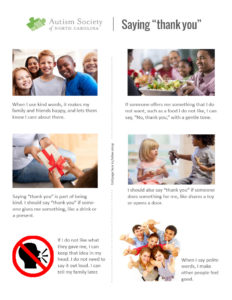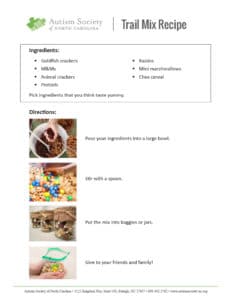We’re thankful for you
As Thanksgiving nears, we cannot help but think of how grateful we are for all of you, whether you are a friend we serve, one of their family members, part of our staff, a volunteer, or a supporter. Together, we build fulfilling lives for children and adults on the spectrum. We all have much to be grateful for now and throughout the year!
We asked some of our friends to share what they are grateful for in this Thanksgiving season. Enjoy our video!
Teaching “thank you”
Even though this time of year can get busy, it also reminds us to make space for gratitude. Self-help gurus tell us that cultivating gratitude can bring contentment and happiness.
 For our loved ones with autism, teaching them to thank others can be the first step toward gratitude. When we thank people for what they have shared with us – whether that is an actual gift or the gift of themselves – we also are connecting with them and showing that we value them. This social skill is critical to helping our loved ones with autism make friends, get a job, and live a fulfilling life.
For our loved ones with autism, teaching them to thank others can be the first step toward gratitude. When we thank people for what they have shared with us – whether that is an actual gift or the gift of themselves – we also are connecting with them and showing that we value them. This social skill is critical to helping our loved ones with autism make friends, get a job, and live a fulfilling life.
For some individuals on the spectrum, this may mean teaching them to say “thank you” even when they are reluctant to do so. They may not feel thankful; maybe they are disappointed in a gift or do not like the food that is offered. Thanking people is a social skill that can be taught. Try using our example social narrative or writing your own.
Cultivating gratitude
As a parent, you can cultivate gratitude with daily practice. Consider your loved one’s age and developmental level when deciding where to start.
Note happiness: Each day, ask your children to name someone or something that made them happy. Try to make it a habit at bedtime or dinnertime.
Teach emotions: If your loved one is still learning about emotions, find opportunities to talk about them, such as pointing out people who look happy or pointing out when they themselves are happy.
Gratitude jar: Keep a large jar on your kitchen counter and make it a practice for family members to write happy memories or things they are grateful for on slips of paper. Next year, pull the slips out of the jar and read about all of the things for which you are grateful!
Model gratitude: Remember to thank your loved one and talk about things for which you are grateful throughout your day.
Expressing gratitude
If you’d like to take a step beyond words and thank people with actions, here are some ideas.
Write a note: Here are two designs you can use to help your loved one share their thankfulness.
 Volunteer: Giving back to others is another way your loved one can show gratitude for what they have. Check with local nonprofits such as food banks to see whether they have opportunities for your family.
Volunteer: Giving back to others is another way your loved one can show gratitude for what they have. Check with local nonprofits such as food banks to see whether they have opportunities for your family.
Share treats: Almost everyone enjoys a sweet treat! Delivering something homemade with a thank-you note will bring expressions of thankfulness for your loved one. We have three recipes on various levels from which you can choose.
Tags: ASNC, Asperger Syndrome, Asperger's Syndrome, autism, autism asperger parenting tips, autism behavior, autism communication, autism gratitude, autism nc, autism north carolina, autism social skills, autism society north carolina, autism society of NC, Autism Society of North Carolina, Autism spectrum, Autism Spectrum Disorder, Autism Spectrum Disorders, Developmental disability Go back
